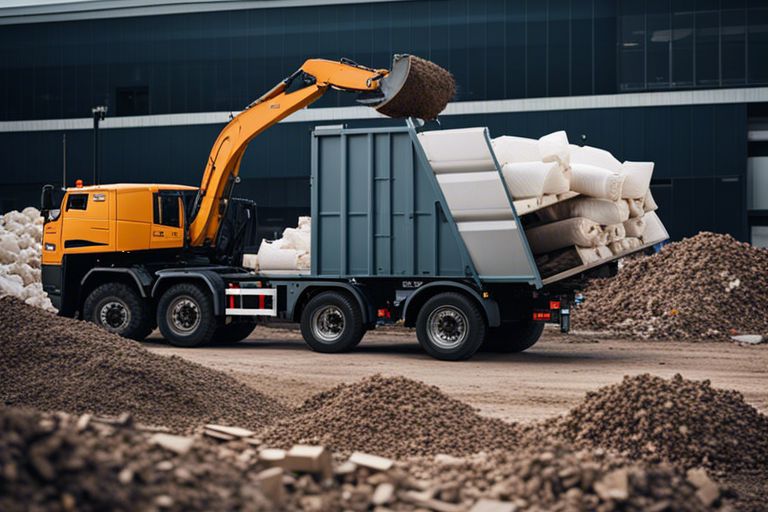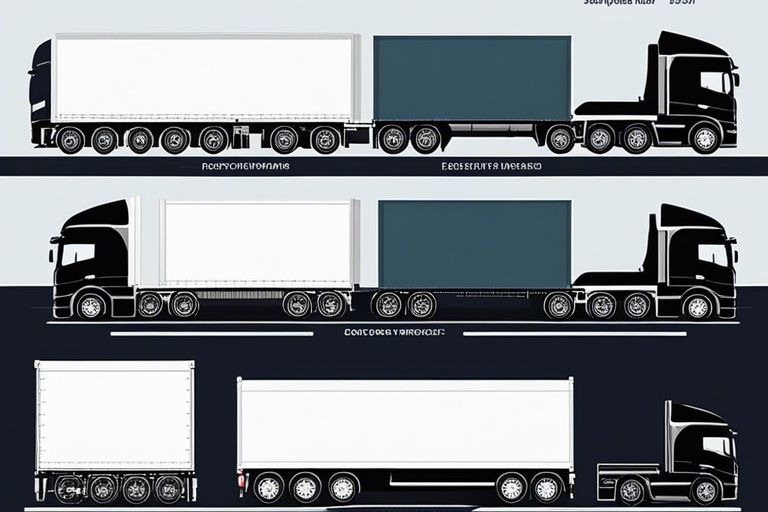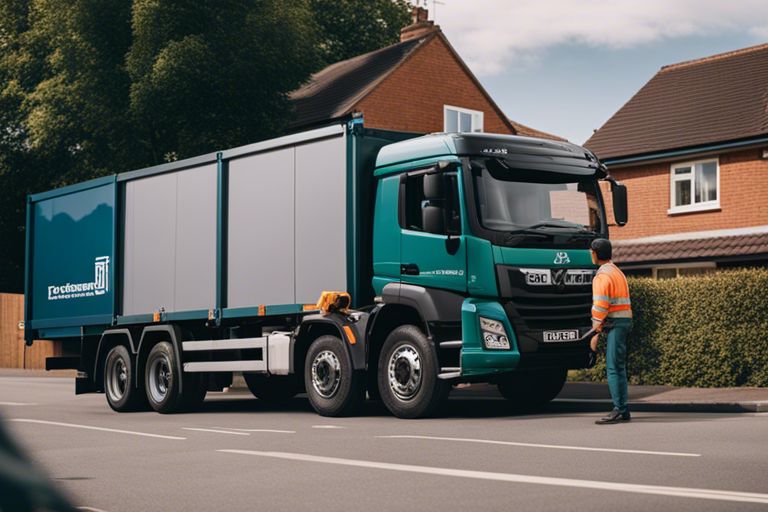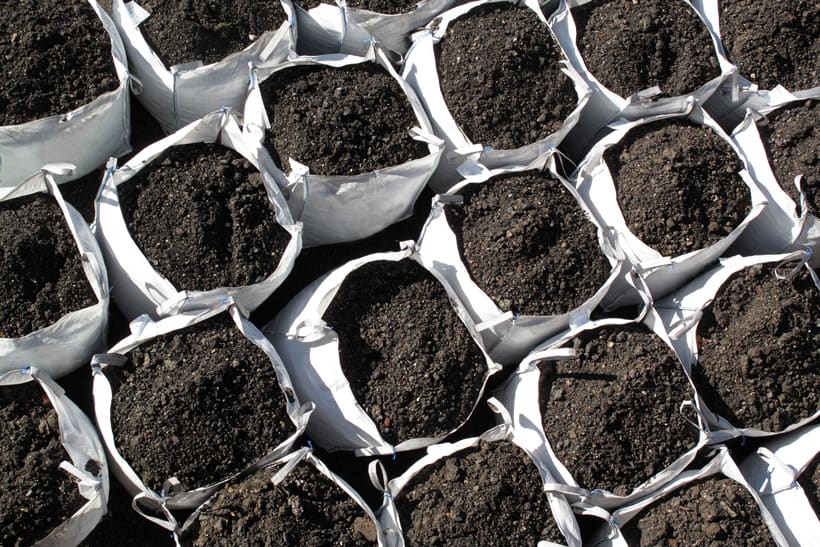Ensuring compliance with the Duty of Care regulations for waste removal is a critical responsibility for businesses and individuals alike. Failure to adhere to these regulations can result in severe consequences, including hefty fines and legal action. It is imperative to be well-informed and up to date with the relevant laws and guidelines to avoid any potential hazards.
Understanding the intricacies of waste classification, storage, and disposal is essential for compliance with the Duty of Care regulations. Proper waste management not only mitigates environmental harm, but also safeguards public health and safety. In this comprehensive guide, we will delve into the key requirements and best practices for complying with the Duty of Care regulations, ensuring that your waste removal processes align with the legal framework.
Key Takeaways:
- Understanding Duty of Care: Waste producers must ensure that their waste is handled, stored, and disposed of responsibly and legally, following the Duty of Care regulations.
- Proper Waste Documentation: It is essential to maintain accurate records of waste transfers, including waste consignment notes, to comply with the Duty of Care regulations.
- Training and Communication: Employers and waste producers must provide adequate training and clear communication to all staff involved in waste removal to ensure compliance with the Duty of Care regulations.
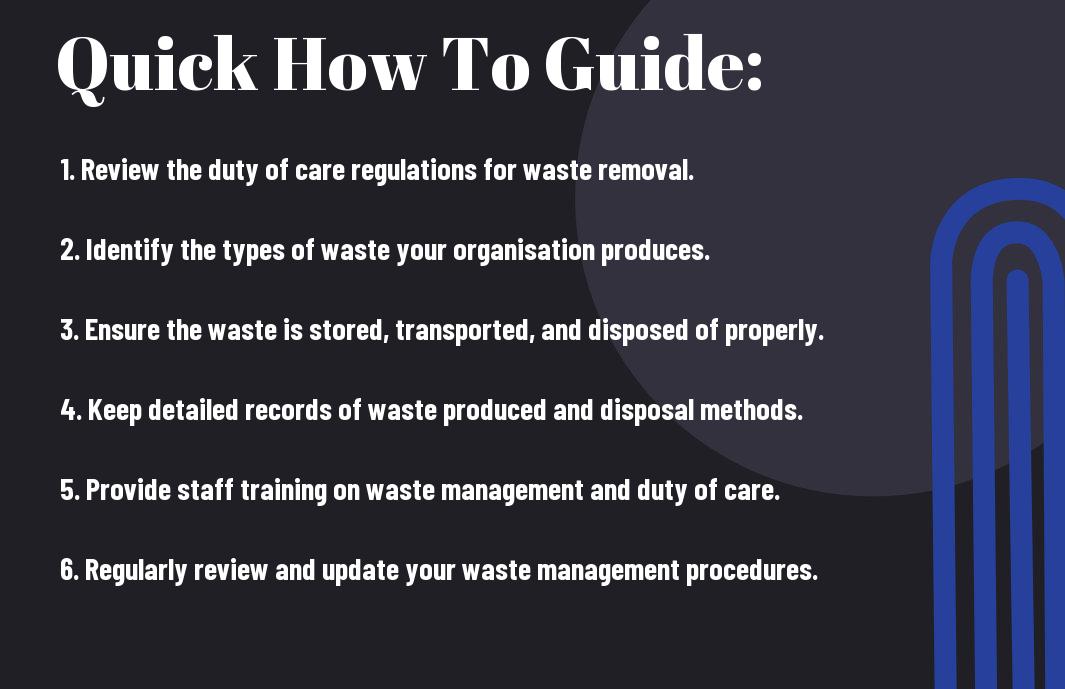
Preparing for Compliance
Before diving into the specifics of waste management duty of care, it is crucial to understand the factors that determine duty of care obligations. By being aware of these factors, you can have a clearer overview of what is expected of your business or organisation.
Factors Determining Duty of Care Obligations
When it comes to waste disposal, the type and quantity of waste your business produces will determine your duty of care obligations. Additionally, your methods of waste storage and transportation, as well as your selection of waste management services, can also impact your obligations. Furthermore, the impact of your waste on the environment and public health is a significant factor in determining your duty of care responsibilities.
- Type and quantity of waste
- Methods of waste storage and transportation
- Selection of waste management services
- Impact of waste on environment and public health
Perceiving the importance of these factors and how they relate to your business operations is crucial in preparing for compliance with the duty of care regulations.
How to Conduct a Waste Audit
Conducting a waste audit is a key step in ensuring compliance with duty of care regulations. By thoroughly examining and documenting the types and quantities of waste your business produces, you can effectively assess your waste management practices. This will allow you to identify areas for improvement and ensure that your business meets the required standards for waste disposal.
Furthermore, a waste audit also involves evaluating the waste management infrastructure in place and assessing its effectiveness in minimising environmental impact. By conducting a comprehensive audit, your business can demonstrate its commitment to responsible waste management and comply with duty of care obligations.
Methods of Compliance
There are several methods for complying with the duty of care regulations for waste removal. Whether you are a small business or a large organisation, it is essential to have a compliant waste removal system in place to avoid penalties and protect the environment. The following subsections will outline tips for setting up a compliant waste removal system and how to train your team on waste handling procedures.
Tips for Setting Up a Compliant Waste Removal System
Setting up a compliant waste removal system involves several key steps to ensure compliance with waste regulations and the safe disposal of waste. Firstly, it is important to conduct a thorough waste audit to identify the types and quantities of waste generated by your organisation. Next, you should designate specific areas for the storage and collection of different types of waste, and implement a clear labelling and segregation system. The training of staff on the proper waste handling procedures and the use of appropriate protective equipment is also crucial. The regular monitoring and review of the waste removal system should be carried out to identify any areas for improvement. The implementation of a documented waste management plan is essential to demonstrate compliance with the duty of care regulations.
How to Train Your Team on Waste Handling Procedures
Training your team on waste handling procedures is a fundamental aspect of complying with the duty of care regulations. The provision of comprehensive training on the proper handling, storage, and disposal of different types of waste is essential to ensure that all staff are fully aware of their responsibilities. The training should cover the identification of hazardous waste and the use of appropriate personal protective equipment (PPE) when handling such waste. It is critical to emphasise the importance of following the waste management plan and to provide ongoing support and guidance to staff members. The regular refresher training should be provided to keep the team up to date with any changes in waste regulations and procedures.
For more in-depth training, consider enrolling your team in a waste management course to ensure they have a comprehensive understanding of their duties in waste handling and comply with the duty of care regulations. The training should be tailored to the specific needs and requirements of your organisation, taking into account the types of waste generated and the specific risks associated with your operations.
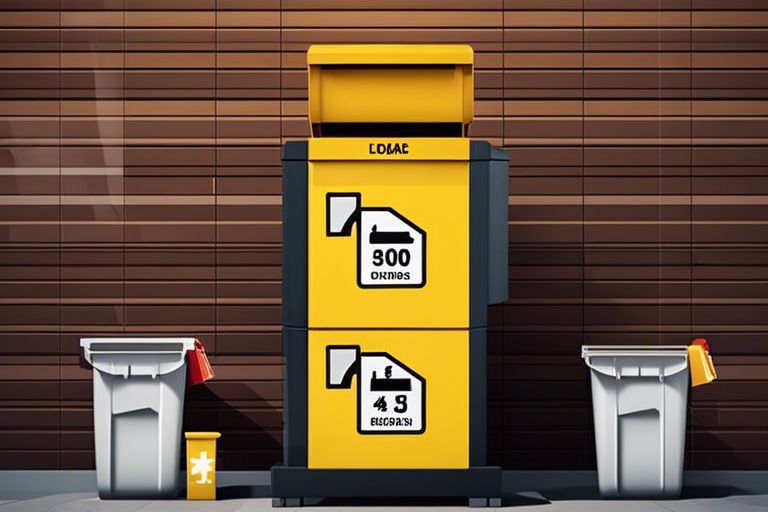
Maintaining Compliance
Once you have established your waste removal processes to comply with the duty of care regulations, it is crucial to maintain compliance to avoid potential legal and environmental implications. This involves ongoing monitoring, reporting, and being proactive in responding to changes in regulations and practices.
Monitoring and Reporting: How to Keep Records
Monitoring and reporting play a vital role in maintaining compliance with duty of care regulations for waste removal. It is essential to keep thorough records of waste types, quantities, and disposal methods. This includes regular inspections of waste storage areas and work processes to ensure compliance with regulations. Additionally, maintaining accurate records of waste transfers, including the details of the waste carrier and the disposal facility, is crucial for demonstrating compliance.
Responding to Changes in Regulations and Practices
As duty of care regulations and waste removal practices evolve, it is imperative to respond proactively to these changes to maintain compliance. This involves staying updated with any revisions to regulations and industry best practices. It may require adjusting your waste removal processes, updating documentation, or providing additional training to staff to ensure they are aware of and compliant with the changes. Failure to respond to these changes can result in non-compliance, leading to potential legal and environmental consequences.
It is essential to stay informed and up-to-date with any changes in duty of care regulations and waste removal practices to ensure ongoing compliance. This may involve seeking guidance from regulatory authorities, attending training sessions, or engaging with industry associations to stay abreast of the latest developments.
Advanced Strategies
When it comes to complying with duty of care regulations for waste removal, advanced strategies can be implemented to enhance efficiency and effectiveness. By utilising advanced techniques and leveraging technology, businesses can further reduce their environmental impact and improve waste management processes.
- Implementing Waste Reduction Techniques
- Leveraging Technology for Efficient Waste Management
| Implementing Waste Reduction Techniques | This involves identifying opportunities for waste minimisation and implementing measures to reduce the amount of waste produced within the business. |
| Leveraging Technology for Efficient Waste Management | This strategy involves using modern and innovative technologies to streamline waste management processes, monitor waste generation, and enhance recycling and recovery efforts. |
Implementing Waste Reduction Techniques
Businesses can adopt various waste reduction techniques such as source reduction, recycling, and reusing materials. By implementing these techniques, companies can significantly reduce the amount of waste sent to landfills, thereby minimising their environmental impact.
Leveraging Technology for Efficient Waste Management
Technology plays a crucial role in modern waste management. By using advanced waste management software, GPS tracking systems, and automated sorting equipment, businesses can enhance their waste management processes. This can lead to improved efficiency, cost savings, and enhanced recycling rates.
Businesses that effectively leverage technology for waste management can benefit from real-time data analytics, enabling them to make informed decisions and optimise their waste management strategies. These technological advancements can positively impact the business’s environmental performance and compliance with duty of care regulations.
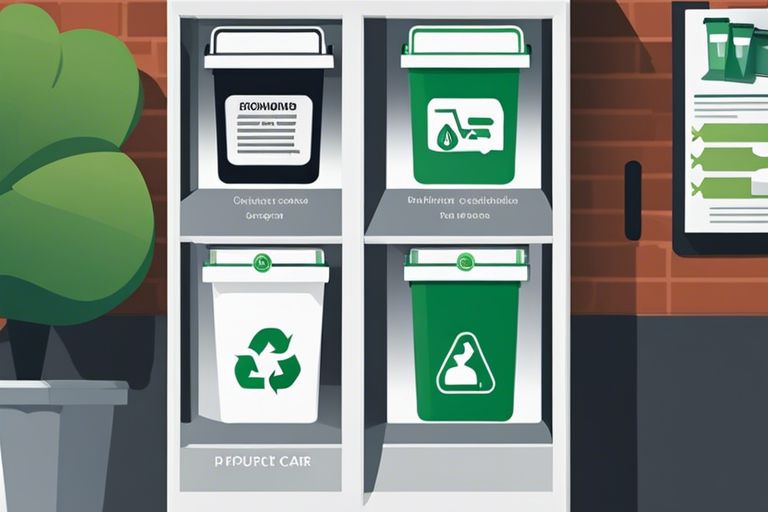
Complying with the Duty of Care Regulations for Waste Removal
In conclusion, it is imperative for businesses to adhere to the duty of care regulations for waste removal in order to protect the environment and public health. By ensuring that all waste is properly stored, transported, and disposed of, organisations can minimise the risk of pollution and avoid potential legal ramifications. It is essential to conduct thorough waste audits, provide staff with adequate training, and maintain accurate documentation to demonstrate compliance with the regulations. Additionally, businesses must be vigilant in selecting reputable waste management companies and regularly review and update their waste management policies to reflect any changes in legislation. By taking these proactive measures, businesses can fulfil their duty of care obligations and contribute to a cleaner and healthier environment for all.
FAQ
Q: What are Duty of Care Regulations for Waste Removal?
A: Duty of Care Regulations for Waste Removal are a set of legal requirements that govern the proper management, handling, and disposal of waste materials to protect human health and the environment.
Q: Who is responsible for complying with Duty of Care Regulations for Waste Removal?
A: Any individual or organisation that produces, imports, carries, keeps, treats, or disposes of controlled waste has a legal duty to comply with Duty of Care Regulations for Waste Removal.
Q: What are the key requirements of Duty of Care Regulations for Waste Removal?
A: Key requirements include ensuring that waste is safely stored, transported, and disposed of, keeping accurate records of waste transfer, and using only authorised waste carriers and disposal facilities.
Q: How can I ensure compliance with Duty of Care Regulations for Waste Removal?
A: To ensure compliance, it’s essential to conduct thorough waste audits, provide staff training on waste management best practices, and regularly review and update waste management procedures.
Q: What are the penalties for non-compliance with Duty of Care Regulations for Waste Removal?
A: Non-compliance can result in severe fines, legal action, damage to reputation, and harm to the environment. It’s important to take Duty of Care Regulations for Waste Removal seriously and ensure full compliance at all times.


